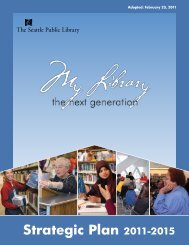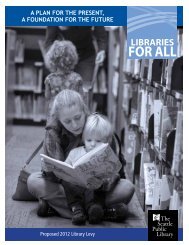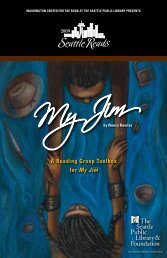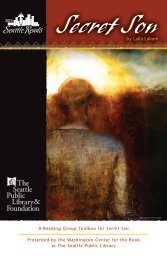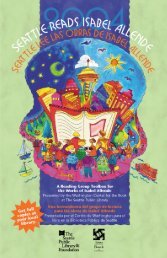Download - Seattle Public Library
Download - Seattle Public Library
Download - Seattle Public Library
Create successful ePaper yourself
Turn your PDF publications into a flip-book with our unique Google optimized e-Paper software.
was from Houghton Mifflin, my publisher, but no one I knew, and she said “I need<br />
to know what year you were born.” And then she asked some other fact like where I<br />
was born. I just told her. Sometimes people need some information for a reading for<br />
a flyer or something. And then she said: “You don’t know why I am calling, do you?”<br />
And I said, “No, why are you calling?” And she said, “You just won the Pulitzer.” And<br />
that’s how I found out from a person I had never spoken to in my life.<br />
Your given name was Nilanjana but the name that stuck was your nickname<br />
Jhumpa. Gogol, your protagonist was supposed to have a “good name” sent by<br />
his grandmother in India which gets lost in the mail. And now you spend every<br />
interview explaining this Bengali custom of a public and private name. Did you<br />
want to play with names in this book?<br />
The whole book started with a name – Gogol. It belonged to a friend of one of<br />
my cousins in Kolkata. I was made aware of it on one of my visits there many years<br />
ago. The idea made its way to a notebook I keep of story ideas. And I just jotted<br />
down “a boy named Gogol.” And slowly, subconsciously I was sort of meditating on<br />
the idea of names and what they mean, like the whole idea of having two names,<br />
which I didn’t really have, but so many people around me including my sister and<br />
friends did. I took it for granted in my life but knew that it was so inexplicable to<br />
other people in my life.<br />
Another thing we take for granted is the way our parents (and many of us)<br />
were married. Gogol calls his parents’ arranged marriage “unthinkable and<br />
unremarkable.” When were you aware that that was something different about<br />
your parents?<br />
From a very early age. In school my friends would say their parents met in<br />
college or at a high school dance. And I was always aware my parents had married<br />
in a very different way. And when people asked me: “Oh, did your parents have an<br />
arranged marriage?” in a very bewildered and mildly horrified tone of voice, I was<br />
aware it was regarded as a sort of barbaric, unthinkable concept.<br />
There are still people who feel, oh my God, it’s such an exotic old-fashioned sort<br />
of idea and it’s hard to explain that it’s very much a living, thriving tradition. It’s<br />
a way of being married as opposed to the romantic falling-in-love way that also<br />
exists in India.<br />
At the same time, these were my parents and it seemed so normal and I knew so<br />
many people whom I was close to and loved who had gotten married this way. So I<br />
felt both very protective and defensive of my parents and their tradition and also sort<br />
of worried that this might happen to me and that might not be something I wanted.<br />
Speaking of marriage, your own wedding in Kolkata was quite a mob scene with<br />
daily newspaper articles. How was that experience?<br />
I was totally overwhelmed by the level of attention. I just didn’t realize there<br />
would be so much interest in our wedding. I wasn’t thrilled by it. I am a very private<br />
person and felt my marriage should be a private event. I tried to resist it. But then we<br />
realized it was an avalanche and it was going to happen. So we just tried to sort of<br />
accept the attention and have as private a wedding as possible.<br />
When your parents moved to Cambridge, MA and then to Rhode Island in the<br />
late ’60s, what was the community like?<br />
From the stories I hear, it’s similar to the world I depict in the novel. My mother<br />
was always wandering around the streets of Harvard in Central Square pushing me<br />
in my stroller and every time she would see someone who looked Bengali there was<br />
this instant “who are you, where are you from, let’s be friends.” They sort of gathered<br />
a community that way literally from spotting each other on the streets. There were<br />
enough Bengalis to have a growing circle of friends over the years and my parents are<br />
still tied to many of those people, which I think is really remarkable.<br />
But in the book, Gogol, as he grows older, is annoyed by the constant weekend<br />
parties with other Bengalis. He describes how his 14th birthday is just an<br />
excuse for his parents to have friends from three states visit and cook food,<br />
make sandesh out of ricotta cheese and play cards and chat while the bored kids<br />
watch television.<br />
It’s true I was always of two minds. On one hand I found these get-togethers<br />
tedious and monotonous and not what I would choose to do with my weekends<br />
every weekend. It was very clear it was very much about the parents and their need<br />
to really relax on the weekends. When you are a foreigner and still getting used to<br />
the culture, you are walking a fine line. The parties on the weekend allowed them to<br />
forget all that and just speak in Bengali and eat food and celebrate in a way that they<br />
weren’t allowed to on a daily basis.<br />
Once my parents moved to Rhode Island they were still crossing state borders<br />
to attend these parties – it was a huge priority in their lives, especially for my mother<br />
who was more isolated since she didn’t work for a long time.




